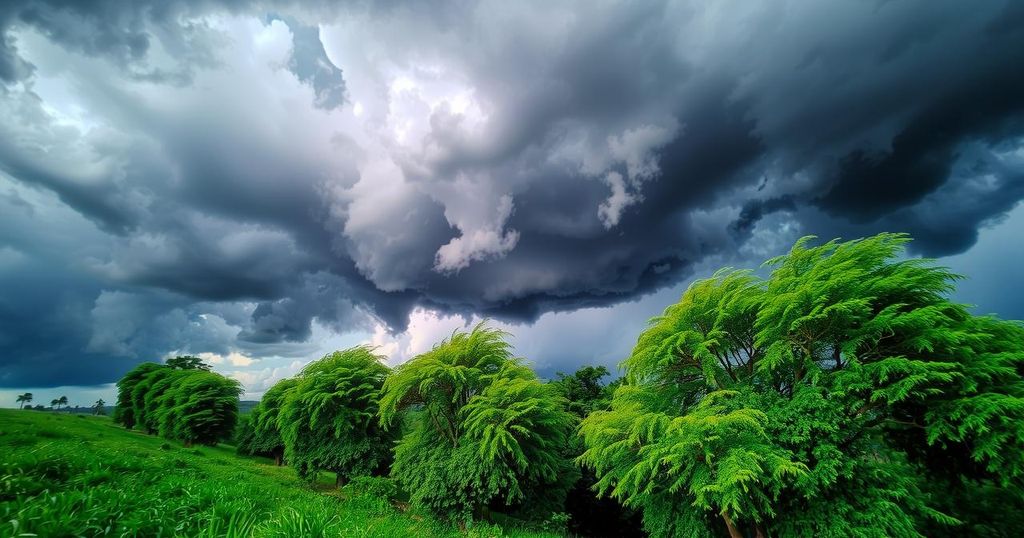Mozambique faces a severe cyclone crisis, having experienced three destructive storms—Chido, Dikeledi, and Jude—in three months. These storms have displaced thousands, overwhelmed humanitarian efforts, and raised concerns among experts regarding increasing cyclone frequency in the region. Investment in disaster preparedness and infrastructure is essential to enhance resilience and protect vulnerable communities.
Mozambique is currently grappling with a severe crisis, having experienced three cyclones—Chido, Dikeledi, and Jude—within a span of merely three months. These storms have devastated one of the most impoverished areas globally, displacing countless individuals and severely stretching the capabilities of humanitarian organizations. Experts are increasingly alarmed that such extreme weather occurrences may become a regular aspect of life in the region.
Typically, Mozambique’s cyclone season extends from November to April; however, the current season has proven particularly severe. Cyclone Chido struck in mid-December, resulting in at least 120 fatalities as it passed through Mayotte before reaching Mozambique. Following this, Cyclone Dikeledi made landfall in January, claiming at least five lives.
Most recently, Cyclone Jude impacted the region with astonishing winds reaching 195 km/h (120 mph), causing substantial destruction. Authorities have confirmed that Jude resulted in the deaths of at least 16 individuals in Mozambique and led to the destruction of over 40,000 households. The United Nations estimates that approximately 420,000 individuals across Madagascar, Malawi, and Mozambique have been affected by this cyclone.
Notably, Cyclones Jude and Dikeledi both impacted Nampula province, situated around 1,400 km (870 miles) north of the capital city, Maputo, while Chido affected an area merely 200 km further north. Humanitarian workers express grave concerns as these repeated catastrophes overwhelm communities still attempting to recover from earlier storms.
The most vulnerable populations in Mozambique, particularly those in remote locales, are ill-equipped to cope with successive climate-related disasters. Guy Taylor, a UNICEF spokesperson, remarked that by the time Cyclone Jude struck, the river basins and dams in Nampula province were “almost full,” exacerbating the disaster. Continuous cyclonic activity is also exhausting emergency resources.
Mozambique has a history of catastrophic storms, including Cyclone Idai in 2019, which resulted in over 600 fatalities. Nevertheless, meteorologists are observing an unmistakable uptick in cyclone frequency within the area. Historically, the nation encountered six to seven tropical storms every decade; however, there have already been ten within the past six seasons.
Langlade highlights that rising ocean temperatures in the Mozambique Channel likely contribute to this phenomenon. Warmer waters serve as energy sources for cyclones, possibly yielding storms that are both stronger and more frequent. Across the southwestern Indian Ocean, eight out of eleven recorded tropical storms this season have achieved full cyclone status, a statistic Langlade notes is considerably higher than the typical 50 percent rate, having exceeded 70 percent this season.
While the reasons for this increase remain uncertain—whether due to natural fluctuations or a consequence of climate change—the impact is clear. Experts emphasize that Mozambique must prioritize disaster preparedness and infrastructure development to better withstand impending storms. Taylor pointed to UNICEF’s initiative to construct over 1,000 cyclone-resistant classrooms as a strong case for investing in resilience. He stated, “If you don’t invest in resilience, it is akin to not having infrastructure at all since it consistently gets destroyed.”
As the cyclone season continues, Mozambique’s future appears precarious, with aid organizations on high alert for the potential of yet another storm.
In conclusion, Mozambique is enduring an unprecedented crisis characterized by a series of destructive cyclones that are overwhelming affected communities and challenging humanitarian responses. The frequency of these extreme weather events is alarming, underscored by a notable increase in cyclone activity attributed to climate factors. Strategic investments in disaster preparedness and resilient infrastructure are imperative for the nation to mitigate the impact of future storms and protect its most vulnerable populations.
Original Source: newscentral.africa






